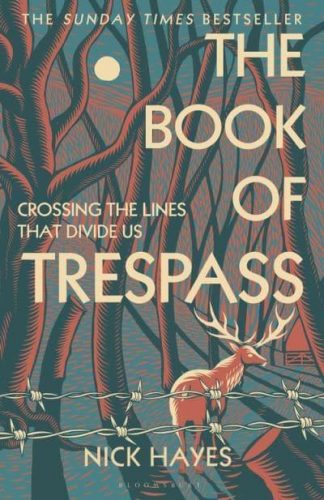
Did you know that you may legally access only 3% of England’s rivers?
The remaining 97% are privately owned. How did that come about? Should England’s citizens be restricted in this way? What is the history behind our segregation from our own land and what are the consequences? Nick Hayes’ explores these issues – and land rights generally – in his fascinating book, ‘The Book of Trespass’.
What’s it about?
Our lack of access to common land in England: how this situation arose, how the laws developed that sustain the status quo and why we should care. I found it surprising how recently some enclosures had been enacted, turning what was well used common land into a valuable resource for a limited number of already wealthy individuals.
Hayes sees truly democratic access to land as key to reducing social inequalities and argues that throughout history the aristocracy have used the arbitrary division of land to sustain their position.
‘Nationalism suits the landowning classes because it gives people a sense of ownership without their actually owning anything at all.’
Finally, he offers some suggestions for what a different approach to land access might look like. In particular, Hayes highlights Scotland’s Land Reform Act, which opened up the vast majority of land in Scotland for public use. Within the Outdoor Access Code are a clear set of rights and responsibilities, balancing a citizen’s rights to access the land with property owner’s rights to privacy and the necessity of protecting the environment.
What’s it like?
Meandering. Fascinating. Thought-provoking. In this part polemic, part wanderer’s journal, part history lesson, Hayes organises chapters loosely around particular trespasses he has committed, exploring the history of the land he seeks to access, the beauty of nature and the way words and laws are used to guard land that, arguably, should be common land.
‘Walls look like order; but more often than not a wall stands at a precise fulcrum of an imbalance in society. Most walls are only necessary as a means of defending the resources of those that have them from those that lack them. In this way, though they present themselves as mechanisms of security, they are in fact tools of oppression.’
Simultaneously rambling across topics – slavery, migration, enclosure acts – but sharply focused on key details, Hayes offers a vision of Eden withheld from the commoners and encourages readers to share his frustration with the arbitrary divisions, the often surprisingly recently erected barriers and blockades that prevent equal access to land. In fact, if you can read this book and the social injustice explored in it doesn’t make you angry at times, then you’re probably a significant landowner!
Each chapter also includes a striking black and white drawing of the place Hayes trespassed in that chapter. These are beautiful to look at and certainly help to reinforce any sense the reader may have of their exclusion from the land. They also, to my mind, reinforce the ridiculousness of some of the more draconian concepts around trespassing. As Hayes explains, trespassing itself is a civil matter, not a criminal one, and drawing is, obviously, completely legal – but if you combine the two, you are committing ‘aggravated trespass’ and can be arrested, meaning that: ‘two rights combine and somehow make a wrong’. While one can immediately understand where this law could be useful (preventing peeping toms, for instance) it also seems somehow contrary to common sense than an adult seeking to draw a beautiful landscape should be prevented from doing so.
Final thoughts
Fundamentally, Hayes urges us all to consider whether the way we currently treat land – as a purely commercial entity, with its commercial value prioritised above all other potential value – needs to be revised and how this could be done. He notes that:
‘Most cultures in the world have at some point held the notion that land cannot belong exclusively to individuals.’
This seems especially pertinent when those individuals are operating on purely commercial instincts.
Perhaps the most unarguable part of Hayes’ treatise is his philosophising about the connections between mankind and nature, culminating when he reflects on a particular campaign to protect a natural area, which was informed by a mythology that teaches us that:
‘The land does not belong to us, but that we belong to it.’
Recommended reading.
‘The Book of Trespass’,
Nick Hayes,
2020, Bloomsbury Publishing, hardback